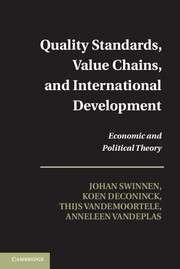Book contents
- Frontmatter
- Contents
- Preface and Acknowledgments
- 1 Introduction
- 2 Modeling Standards
- 3 Efficiency and Equity Effects of Standards
- 4 The Political Economy of Standards and Development
- 5 International Trade and Standards
- 6 Risk, Externalities, and the Nature of Standards
- 7 Endogenous Private and Public Standards in Value Chains
- 8 Butterflies and Political Economy Dynamics in Standard Setting
- 9 The Political Economy of Standards and Inclusion in Value Chains
- 10 Standards, Production Structure, and Inclusion in Value Chains
- 11 Standards, Market Imperfections, and Vertical Coordination in Value Chains
- 12 Market Power and Vertical Coordination in Value Chains
- 13 Price Transmission in Value Chains
- 14 Commodity Characteristics and Value Chain Governance
- 15 Economic Liberalization, Value Chains, and Development
- 16 Standards and Value Chains with Contracting Costs: Toward a General Model
- 17 General Equilibrium Effects of Standards in Value Chains
- References
- Index
4 - The Political Economy of Standards and Development
Published online by Cambridge University Press: 05 August 2015
- Frontmatter
- Contents
- Preface and Acknowledgments
- 1 Introduction
- 2 Modeling Standards
- 3 Efficiency and Equity Effects of Standards
- 4 The Political Economy of Standards and Development
- 5 International Trade and Standards
- 6 Risk, Externalities, and the Nature of Standards
- 7 Endogenous Private and Public Standards in Value Chains
- 8 Butterflies and Political Economy Dynamics in Standard Setting
- 9 The Political Economy of Standards and Inclusion in Value Chains
- 10 Standards, Production Structure, and Inclusion in Value Chains
- 11 Standards, Market Imperfections, and Vertical Coordination in Value Chains
- 12 Market Power and Vertical Coordination in Value Chains
- 13 Price Transmission in Value Chains
- 14 Commodity Characteristics and Value Chain Governance
- 15 Economic Liberalization, Value Chains, and Development
- 16 Standards and Value Chains with Contracting Costs: Toward a General Model
- 17 General Equilibrium Effects of Standards in Value Chains
- References
- Index
Summary
Introduction
As demonstrated in Chapter 3, the introduction of standards typically impacts both efficiency and rent distribution between different groups in society. This, in turn, is likely to induce lobbying by interest groups to influence government decision making on public standards. As we show in this chapter, this may lead to “overstandardization” or “understandardization,” depending on the relative political pressures, much like taxes and subsidies are used in other areas of public policy and public finance.
One can thus expect to observe variations in public standards setting across countries. However, the observed variations in standards do not seem to be random. There appears to be a positive correlation between public standards and the level of economic development. An important question is what causes this correlation. The most straightforward explanation is that rich consumers (countries) prefer higher standards (e.g., Wilson and Abiola, 2003). Although this is undoubtedly an important element, in this chapter we show that the impact of development on the government's choice of standards is more complex and depends on several factors – including, besides consumer preferences, compliance costs, enforcement problems, and institutions of information provision that may influence (consumer) perceptions.
The political economy approach in this chapter, as well as in subsequent ones, is based on the seminal “protection for sale” framework of Grossman and Helpman (1994) but applied to standard setting. We develop a political economy model of public standards in which both producers and consumers are actively and simultaneously lobbying. In this chapter, we apply our model to a closed economy to analyze the essential features of the political economy equilibrium. In Chapter 5, we extend the model to study the political economy of standards in an open economy, and to derive the conditions under which standards can be categorized as protectionist instruments.
We start by developing a model of the economy (Section 4.2) where standards benefit consumers because standards guarantee that the product satisfies certain characteristics preferred by the consumer. Production costs are increasing in the level of the public standard. As in Chapter 3, producers or consumers may gain or lose from a change in the standard. With these potential welfare effects, we derive the political incentives and the political equilibrium (Section 4.3). We then analyze how the equilibrium is affected by several political and economic characteristics (Section 4.4). We show that either over- or understandardization may result (Section 4.5).
- Type
- Chapter
- Information
- Quality Standards, Value Chains, and International DevelopmentEconomic and Political Theory, pp. 34 - 48Publisher: Cambridge University PressPrint publication year: 2015



